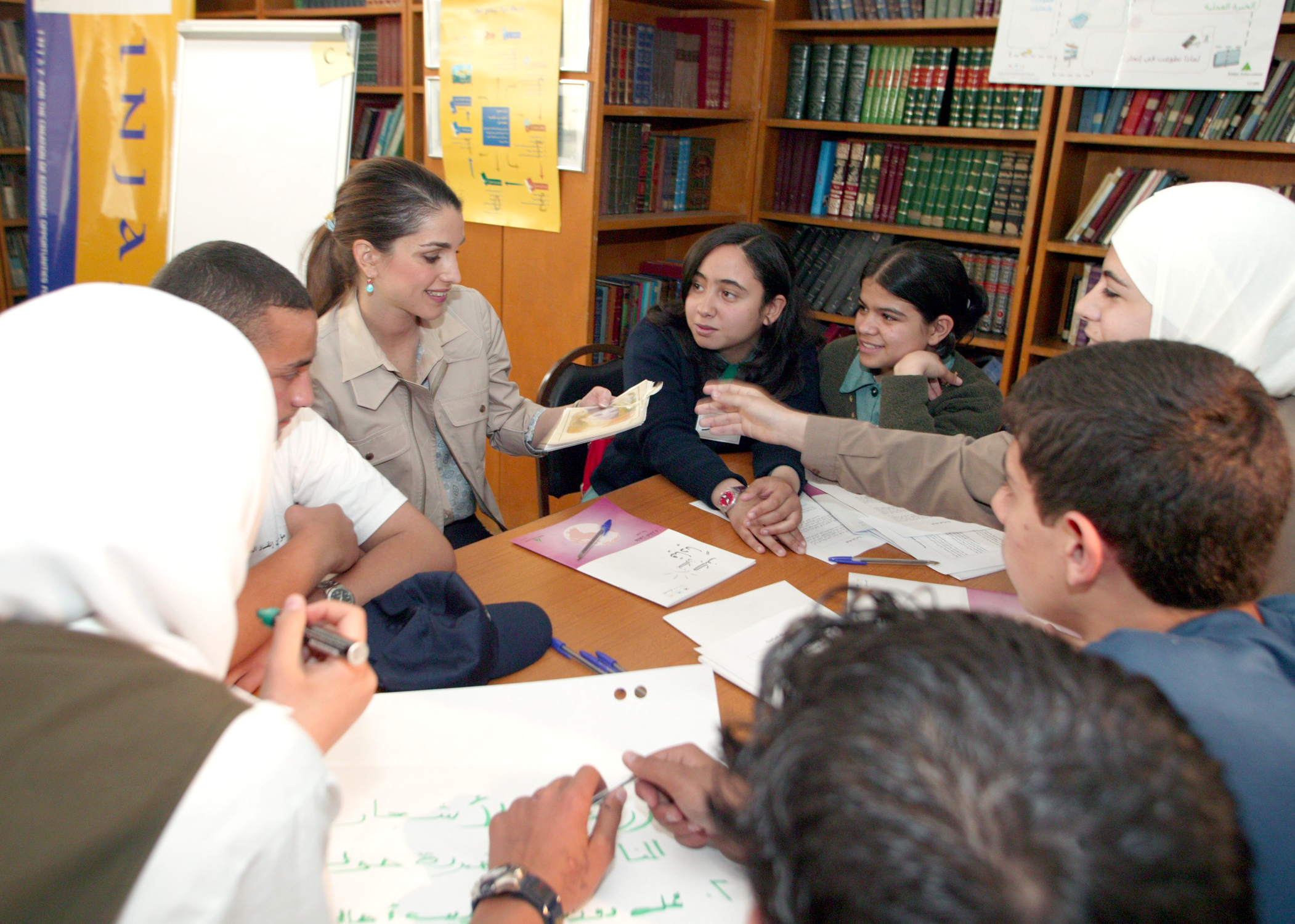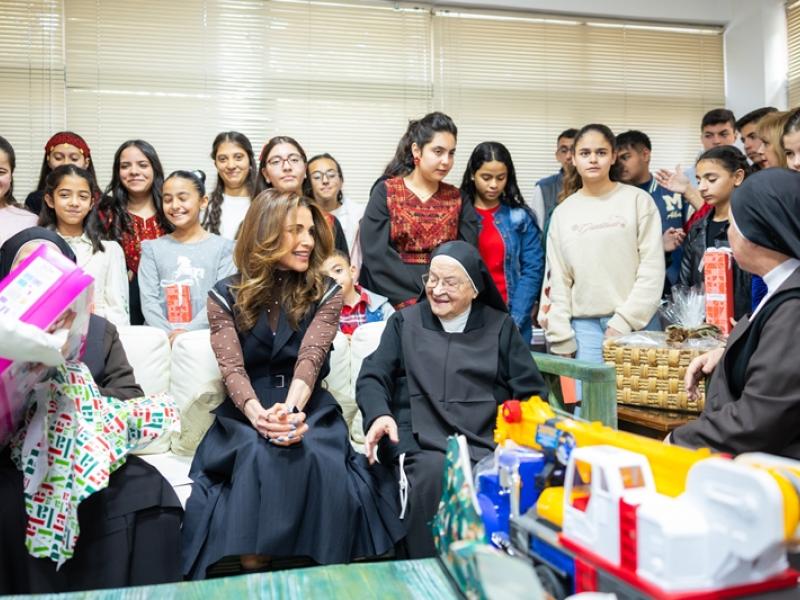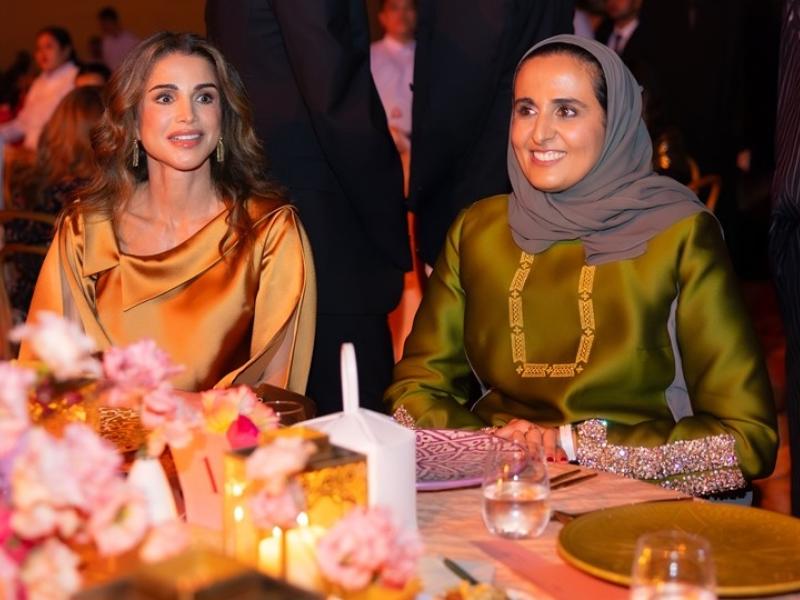(Office of Her Majesty, Press Department - Amman) Around 30 students from different parts of the Kingdom were overwhelmed to find that their volunteer teacher for the day was Her Majesty Queen Rania Al-Abdullah.
Teaching a class of ninth graders, Queen Rania highlighted to students of an INJAZ class qualities of a good leader, most importantly the significance of utilizing these skills to effect positive change and development in society.
This was highlighted through a case study that was reviewed by the students , followed by an interactive discussion with the participation of INJAZ co-volunteer Linda Qar’ous from the private sector. Students from 15 government schools from Amman, Irbid, and Zarqa attending the INJAZ class at Queen Zein Al Sharaf School were inspired and supported by Queen Rania’s interest in issues and active participation in the dialogue.
The class discussed how a successful leader should possess and uphold the virtues of honesty, modesty, delegation of responsibility, and capitalizing on experts in the field in order to bring about positive development.
The case study showcased how a chemical plant affected a nearby agricultural village and its inhabitants. The students split into groups to come up with solutions to the problem.
During the discussion, Queen Rania noted that all aspects of the problem need to be studied and thoroughly addressed while making citizens aware of the issue in order to lobby for change in a positive and effective manner.
Underlining that the approach should be objective, Queen Rania discussed the solutions to the problem presented by the students noting that individuals have a major role in making their voices heard, based on concrete knowledge and on raising awareness on the issue.
“A good leader controls and contains the problem, and is able to turn the negative aspects to achieve positive change for the better,” Queen Rania told the class adding “an obstacle or problem should be our incentive to find solutions and improve any situation.”
Queen Rania said the problem-solving approach adopted in Tuesday’s class can be applied to any situation, citing the example of the issue of the group that was planning subversive acts in the Kingdom, and underlining that citizens' awareness of preserving the country’s stability and security reflected their loyalty to the country.
Queen Rania noted that Jordanians demonstrated that they were sharing the responsibility together with officials and security forces to abort any plans that could underline the country’s and citizens’ best interests.
The Economic Opportunities for Jordanian Youth Program (INJAZ), the country’s first initiative aimed at building the skills of Jordan’s future workforce to help the economy compete globally, was initiated in 1999 and launched as a Jordanian non-profit organization by Queen Rania in 2001.
Supported by 60 private sector companies and supported by the US Agency for International Development (USAID), INJAZ operates in Amman, Zarqa, Irbid, Ma’an, Tafileh and Aqaba, serving Ministry of Education, UNRWA and military schools, providing learning experiences for young people age of 14 to 24 to increase their economic opportunities and empowering Jordanian youth to realize their dreams.
Reaching 16,701 students a semester, private sector volunteers who serve as role models giving 15 hours of their time to work with a class of 25 students based on the participatory learning approach, which fosters creative thinking, critical problem-solving and interpersonal communication skills to help students develop life skills and gain an understanding of business and economics.
The Queen joined students in previous sessions organized by INJAZ bringing together students from different parts of the Kingdom with officials, allowing youth to take an active role in issues of concern to the country at large.
With over 60% of the Jordanian population under the age of 25, Queen Rania is active in promoting a better understanding of the needs of young people and the means to address them, supporting initiatives to promote communication and dialogue among young people and with the nation’s decision-makers underlining “youth are the tools of change and we must reap the benefits of their contributions.”



